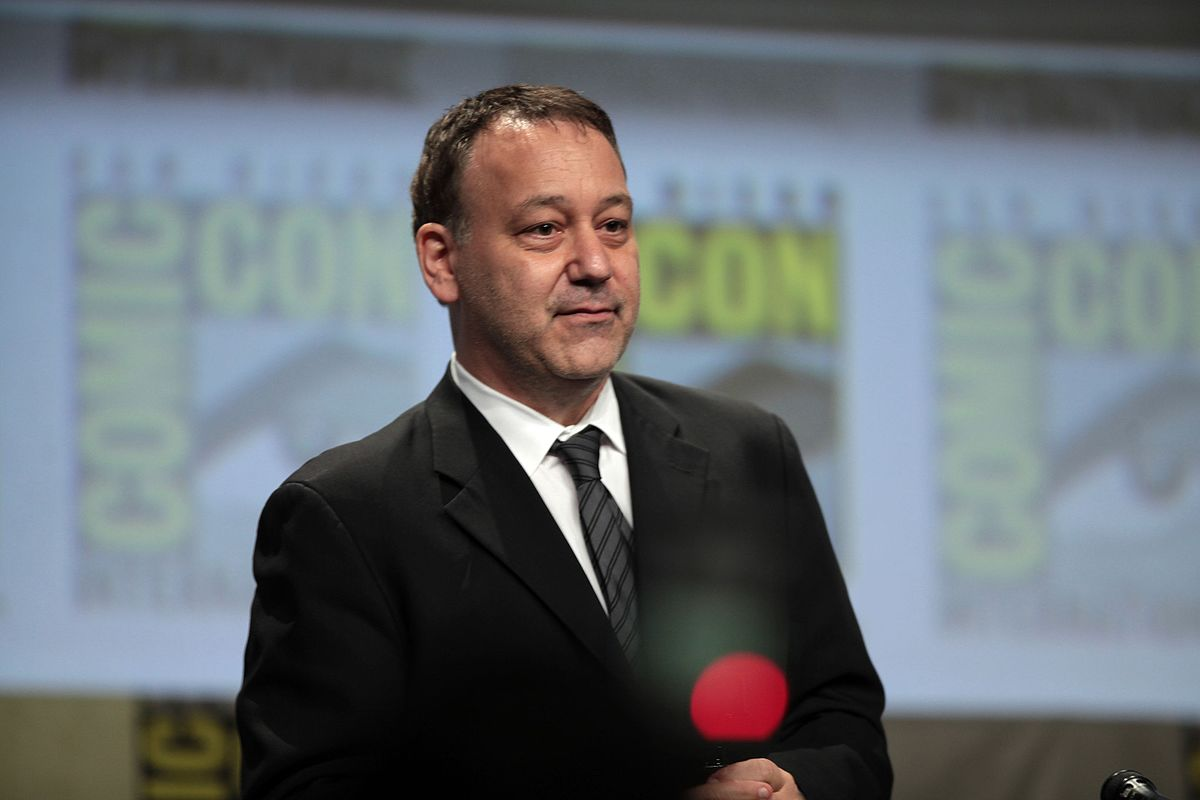Title of the work
Studio / Production Company
Country of the First Edition
Country/countries of popularity
Original Language
First Edition Date
First Edition Details
S05E01. Faith. Directed by Michael Hurst; Written by Alex Kurtzman & Roberto Orci. USA, Syndicated (MCA); September 28, 1998. 44 min. – S05E22. Revelations. Directed by Bruce Campbell; Written by Tom O'Neill & George Strayton. USA, Syndicated (MCA); May 17, 1999. 44 min.
Running time
Format
Date of the First DVD or VHS
Awards
1999 – Hercules: The Legendary Journeys (Joseph LoDuca) won Top TV Series in ASCAP Film and Television Music Awards;
1999 – Hercules: The Legendary Journeys. Season 5, Episode 2 Descent won Film Originated Television Series – Audio Post Production in “International Monitor Awards”.
Genre
Action and adventure fiction
B films
Mythological fiction
Television series
Target Audience
Crossover (teens and older audiences)
Cover

We are still trying to obtain permission for posting the original cover.
Author of the Entry:
Joel Gordon, University of Otago, joel_gordon@hotmail.co.nz
Peer-reviewer of the Entry:
Elizabeth Hale, University of New England, ehale@une.edu.au
Lisa Maurice, Bar-Ilan University, lisa.maurice@biu.ac.il

Sam Raimi by Gage Skidmore. Retrieved from Wikimedia Commons, licensed under CCBY-SA 2.0 (accessed: December 30, 2021).
Sam Raimi
, b. 1959
(Producer)
Sam Raimi is an American filmmaker, actor and producer. He was born in Michigan (USA), to a conservative Jewish family, and attended Michigan State University. His career has been closely linked with that of Robert Tapert. Although Raimi intended to major in English, he chose to put his studies on hold in order to work on the feature film The Evil Dead (1981), after the success of his first co-operative production with Robert Tapert, The Happy Valley Kid (1977). Raimi is a co-founder of both Renaissance Pictures and Ghost House Pictures (see above). His solo-directorial work (distinct from productions with Tapert) include the original Spider-man trilogy (2002–2007) starring Tobey Macquire, and, most recently, Oz the Great and Powerful (2013). His most recent solo-producer role was for the crime-thriller, Don’t Breathe (2016). As an actor, Raimi has appeared in many of his own films as minor characters – such as his cameo appearances in The Evil Dead and its sequels. Raimi turned to television during the 1990’s, working together with Tapert as a producer for the franchises Hercules: The Legendary Journeys, Xena: Warrior Princess, Young Hercules and Spartacus.
Bio prepared by Joel Gordon, University of Otago, joel_gordon@hotmail.co.nz

Robert Tapert by Cooltv. Retrieved from Wikipedia, licensed under CC0 (accessed: December 30, 2021).
Robert Tapert
, b. 1955
(Author, Producer)
Robert Tapert is an American actor, producer and writer. Born in Royal Oak, Michigan (USA), he attended Michigan State University where he first began experimenting with filmmaking under the influence of Sam Raimi. During this time, they both worked on the film The Happy Valley Kid (1977) in which Tapert also starred in the leading role. Following the success of this venture, the pair began work on their first feature film, The Evil Dead (1981) – directed by Sam Raimi and starring Bruce Campbell – and, in order to assist with its production, Tapert, Raimi and Campbell (along with Irvin Shapiro) co-founded Renaissance Pictures in 1979. This trio have since worked together on numerous successful films – particularly in the horror genre – including: Crimewave (1985), Easy Wheels (1989), Darkman (1990), Lunatics: A Love Story (1991), Timecop (1994), 30 Days of Night (2007) and The Gift (2015). In 2002 Tapert and Raimi co-founded Ghost House Pictures known for, among others, the film franchises The Grudge (2004, 2006, 2009) and Bogeyman (2005, 2007, 2008). Tapert’s involvement in television began during the 1990’s with his most notable productions being the franchises of Hercules: The Legendary Journeys (1995-1999), Xena: Warrior Princess (1995–2001) and Young Hercules (1998–1999) – all of which included both direct-to-television movies and television serials spanning several seasons. It was during this period – in 1998 – that Tapert married New Zealand actress Lucy Lawless (the star of Xena), with whom he has since had two children. More recently, his interest in antiquity and television has returned with the serials Spartacus: Blood and Sand (2010), Spartacus: Gods of the Arena (2011), Spartacus: Vengeance (2012) and Spartacus: War of the Damned (2013) and plans for a Xena reboot for NBC. (see further, his official website, accessed: August 16, 2019).
Bio prepared by Joel Gordon, University of Otago, joel_gordon@hotmail.co.nz

Christian Williams by Pacunagonz. Retrieved from Wikimedia Commons, licensed under CC BY-SA 4.0 (accessed: December 30, 2021).
Christian Williams
, b. 1943
(Author, Producer)
Christian Williams is an American journalist and television writer from Brooklyn, New York. His career in the news industry began in 1972 as an assistant editor (Style Section) for The Washington Post. It was during his early years at the Post that Williams was given a unique insight into the film/television industry, serving as the editor on a behind-the-scenes exclusive when Robert Redford used the Post’s newsroom to research his film All the President’s Men (1976). In 1984 Williams became a reporter in Bob Woodward’s investigative team which led to his second interaction with the film/television industry: in 1986 Woodward’s team (Woodward, Williams and co-journalist Richard Harwood) wrote and featured in an ABC movie, Under Siege, which was based upon the group’s reporting on domestic terrorism. Williams then continued to dabble in the television industry, co-writing (alongside Woodward) an episode of the television drama series Hill Street Blues (1981–1987), before formally leaving journalism for a career as a television writer – specializing in one-hour drama television shows. He went on to co-create (alongside David Milch) the drama Capital News (1990) before assisting in the creation of Hercules: The Legendary Journeys franchise (which began with the five direct-to-television films). Unlike Tapert and Raimi, however, Williams was not directly involved in the production of the Hercules: The Legendary Journeys serial beyond the pilot films. Williams went on to continue writing for television, for example as the co-executive producer of the drama Six Feet Under (2001–2005), until he retired in 2010. He has since turned his interests to authoring books and sailing.
Bio prepared by Joel Gordon, University of Otago, joel_gordon@hotmail.co.nz
Casting
Main Cast:
Hercules: Kevin Sorbo,
Iolaus (and Dahok, Iolaus II): Michael Hurst.
Supporting/Recurrent Cast:
Aphrodite: Alexandra Tydings,
Archangel Michael: Charles Mesure,
Ares: Kevin Smith,
Autolycus: Bruce Campbell,
Balder: Rupert Cox,
Bronagh: Alistair Browning,
Deimos: Joel Tobeck,
Discord: Meighan Desmond,
Gilgamesh: Tony Todd,
Imuru: Ross Duncan,
Jason: Jeffrey Thomas,
Julius Caesar: Karl Urban,
King Arthur: Neill Rea,
Loki: Ian Hughes,
Merlin: Tim Faville,
Morrigan: Tamara Gorski,
Nautica: Angela Dotchin,
Nebula: Gina Torres,
Odin: Peter McCauley,
Salmoneus: Robert Trebor,
Thor: Ben Reed,
Zarathustra: George Henare.
Adaptations
Sequels, Prequels and Spin-offs
Summary
The fifth and penultimate season of Hercules: The Legendary Journeys maintains the same structure as the earlier seasons with 22 stand-alone episodes depicting Hercules’ battle against ‘evil’ (in all of its various guises) and, in his role as champion of the people, his righting of the wrongs performed against the innocent. Certain tropes established in seasons three and four are now cemented as recurrent features: in particular, the modern, metatheatrical take on the clip show format with E9 (For Those of You Just Joining Us) depicting the production crew on a writing retreat (cf. S4E15); and the inclusion of the science fiction elements of alternative universes (e. 13, Stranger and Stranger), time travel (E19, Once Upon a Future King), and the problems that can be created by the interaction of multiple timelines (E21, My Best Girl's Wedding).
However, unlike previous seasons, season five has Hercules interact with heroes, villains and mythological figures from other ancient cultures and with which he had no association during antiquity. These non-Greco-Roman cultures include: Sumerian (i.e., Gilgamesh; E1–2 Faith, Descent), Celtic (i.e., druids; E3 Resurrection), Arabic (i.e., genies [Djinn]; E4 Genies and Grecians and Geeks, Oh My), Nordic (i.e., Balder, Loki, Ragnarok, Thor etc.; E6–7 Norse by Norsevest, Somewhere Over the Rainbow Bridge), Persian/Zoroastrian (i.e., Zarathustra; E10, Let There Be Light), Judeo-Christian (i.e., Archangel Michael and the Four Horsemen of the Apocalypse; E22 Revelations), and even medieval Europe (i.e., Merlin, Arthur, Camelot etc.; E19, Once Upon a Future King). This is not to suggest that Hercules is removed entirely from his Greco-Roman heritage for he also meets the fictionalized figure of Julius Caesar (E5 Render Unto Caesar) and maintains his interactions with the Greco-Roman pantheon throughout the season. It is clear, however, that Greco-Roman material has a much lesser influence on the narrative than in previous seasons. This is evident in that the primary antagonist of this season is the figure of Dahak (also known as ‘the darkness’), whose evil influence has spread across the various ‘realms’ that Hercules travels to and thus unites the otherwise disjointed adventures. The in-show explanation for the muted influence of the Greco-Roman pantheon (and thus the generally lesser presence of Greco-Roman mythological material) is that the gods were severely weakened by the power of Dahak’s “darkness” and so had fled or had been slain for resisting him.
Analysis
At this point in the shows production, the HTLJ franchise had taken on a much darker tone than when it first started (case in point being the death, possession and exorcism of Iolaus, see also below on deicide). Both this darker tone and the more disjointed, episodic nature of season five (i.e., with Hercules changing locale/culture every few episodes) was a clear attempt by the show’s creators/writers to reinvigorate the now waning popularity of the show – even at the expense of younger viewers. The darker tone can be traced to the influence of the more popular spin-off of the HTLJ franchise, Xena: Warrior Princess, which had embraced exploring more mature material (such as Xena’s sexuality) and, less unencumbered by the clear affiliation of Hercules with Greco-Roman culture, had more freely explored alternate mythological influences and possibilities (e.g., see below on deicide). The disjointed nature of HTLJ s. 5, in turn, finds parallels in other popular shows contemporary to this later period of HTLJ’s development such as The Adventures of Sinbad (2 seasons, 1996-1998) and Jack of All Trades (2 seasons, 2000).
It is interesting to note that it was in this season that the HTLJ serial first presented deicide (i.e., the death of Olympians) as a recurring narrative pillar. Deicide is a concept foreign to ancient Greek mythology – for divine nature required the gods to be athanatoi (literally, ‘undying’) and, until now, this approach to the gods’ immortality had maintained with the exception of only minor immortal figures (e.g., Chiron in HTLJ S0E3: Hercules and the Circle of Fire), rather than gods per se (note that Hera had been imprisoned in Tartarus – rather than put to death – as punishment for her crimes at the end of season 3). This said, the phenomenon of (violently) slaying the Greco-Roman pantheon became an established trope of visual mass media from the mid-90’s onwards (culminating in blockbusters such as Immortals, 2011, and Wrath of the Titans, 2012), first appearing on television in the HTLJ spin off, XWP, with Xena killing Bacchus in the episode “Girls just wanna have fun” (XWP S2E4) – demonstrating again, the influence of this more popular serial on its predecessor. The origins of such deicide, however, do not lie with XWP but can be traced back to the particular styling of contemporary heroism found in comic books during the latter half of the 20th century. The adoption of this kind of hero was a natural outworking of HTLJ’s framing of Hercules as a fantastical, heroic figure and is not surprising given that writers such as Gerry Conway (who worked on e.s 6, 7, 13, 20 and 21) had previously written for both Marvel and DC comics, working on the characters of Thor and Hercules in this medium.
Further Reading
See entry: “Hercules: The Legendary Journeys TV Series: Season 1”.
On the concept of deicide (in particular, in XWP and HTLJ):
Gordon, J., "When Superman smote Zeus: Analysing violent deicide in popular culture", Classical Receptions Journal 9.2 (2017): 211–236, doi.org (accessed: May 07, 2020);
Gordon, J., "“I am Hercules” in 2014: Rebooting and rationalizing a modern hero", in A. J. L. Blanshard & E. J. Stafford, eds., The Modern Hercules, Part II: From Image to Screen, Brill: Metaforms series (forthcoming);
Maurice, Lisa, Screening Divinity, Edinburgh: Edinburgh University Press, 2019, 185–199 (“Blurring the Boundaries: Apotheoses and Deicides”);
Tomasso, V., "The Twilight of Olympus: Deicide and the End of the Greek Gods", in M. Cyrino and M. Safran, eds., Classical Myth on Screen, New York: Palgrave Macmillan, 2015, 147–57.


